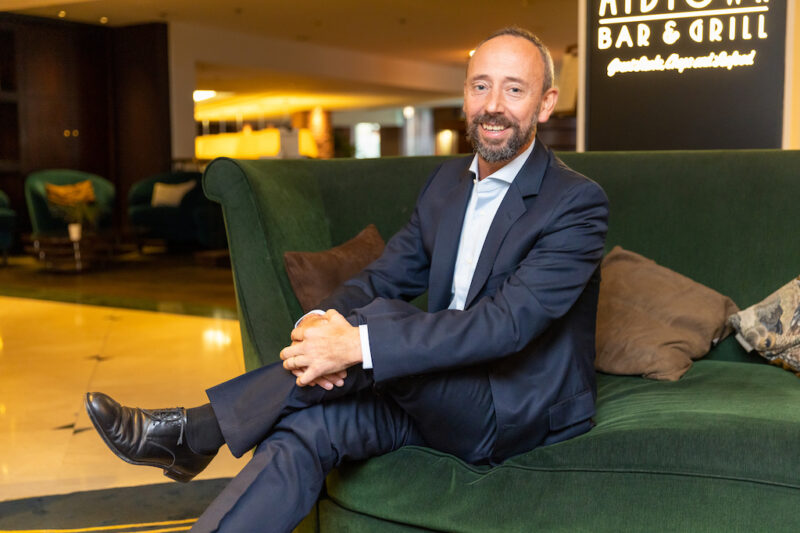Exclusive: Ferrero World Confectionery Conference preview interview

The World Confectionery Conference will be returning as a live showcase this autumn. Editor Neill Barston speaks exclusively to Francesco Tramontin, Ferrero’s vice president of EU institutional relations and the group’s public policy centre, who will be featuring as part of a dynamic line-up of speakers for our must-attend event of 2023
Getting to grips with some of most significant global environmental, social and corporate responsibility policy of our times is no small undertaking indeed. But it’s something that Francesco Tramontin of Ferrero assuredly takes in his stride, as he seeks to inform his own company’s outlook on a host of pressing international issues.
As he acknowledges in an exclusive interview with Confectionery Production, these remain testing times on a number of levels, including companies facing notable rises in inflation that has had a considerable impact around the globe. So too, have issues relating to supply chains and logistics, which have also been affected within many sectors over the past two years in dealing with the major crisis of the Covid-19 pandemic, as well as the ongoing impact of the conflict in Ukraine.
But despite these issues, Francesco, who is set to make a return to speak at the 2023 edition of our World Confectionery Conference on 5 October in Harrogate, believes that there is cause for genuine optimism within the industry (you can catch the video version of the interview here).
“I’m excited to be speaking again, as I got a very good energy out of the audience interaction we had last time. It’s been just a few months since the event, and the outlook for the business environment has intensified, but that’s my role in Ferrero, in trying to dissect those complexities in terms of the company policies and in regards of stakeholders,” explained the senior policy specialist, who enthused that he is looking forward to adding to sustainability-based discussions that formed the core of our conference.

As for his own experiences, Francesco has enjoyed an enviable career to date that has included having spent time working for other major businesses in the sector including Cargill and Mondelēz International. This has leant him an especially-rounded oversight of the confectionery industry, which was thoroughly demonstrated in his presentation in Brussels last September. He added that ‘my passion for the industry very much remains’ in spite of present market uncertainties, and explained that navigating a path through such challenging conditions is something he thrives on.
“I think you need to have a very healthy business in order to get through the situation we are all facing. We still have a long-term approach to our business to cope with the kinds of big shocks we are facing. This has enabled us to handle issues like increases in ingredients prices and energy costs, that have had an impact on our company, and we’ve adapted accordingly. “I think we’re in a good place as an industry. But is this an easy time? Not at all, and we are looking to work with public authorities to find solutions,” he added, observing that collaborative working is very much in its strategic thinking amid such times.
Supply chain challenges
Among the most pressing pieces of legislation to make global headlines these past couple of months has been the EU’s mandatory supply chain due diligence laws that are making their way through the European parliament, covering deforestation and observing enhanced human rights for exporting nations.
Under the EU proposals, major companies with an employee base of over 500 and a turnover of above €150 million would be required to legally to monitor their commercial activities to ensure effective sustainability of business operations to guard against child labour, exploitation of workers and impacts of pollution and biodiversity loss.
The measures have been widely welcomed across Europe, yet tensions have emerged, as countries within some global supply chains, including Indonesia, have expressed concerns that such policies may harm its export of key ingredients such as palm oil. However, the legislation remains in its draft form, and has yet to be formally adopted by the EU, but as Francesco explained, the measures stand to bring notable long-term environmental benefits.

“If we look at the bundle of additional legislation that will affect how we purchase our products, which includes the laws on deforestation that we are awaiting the final texts on, another on due diligence regulation and another on forced labour – the three of them will be very impactful for the whole sector. “As a company, we believe it will consolidate a set of good practices within the industry, particularly the one on traceability of key materials, which is really important,” added Francesco, noting that a risk-based approach favoured by the company would provide a strong framework for implementing such legislation for the sector as a core means of delivering on overall sustainability targets. Clearly, he observed that devising enforcement tools for any fresh legislation will be critical to its success, but he was decidedly hopeful that it represented genuinely positive strides forward.
As for our conference, Francesco enthused that our 2022 edition had served a strong purpose in its first edition in its live format, as it provided a key platform to discussing core legislation, trends and wider industry developments.
Reflecting on the event, he said: “I really enjoyed the diversity in the audience and the discussions that were had on stage. This is the beauty of the confectionery sector with its combination of bigger and smaller enterprises, as well as more technical elements, as well as all the very nice products that are sold to people, which I think was reflected at the conference,” concluded the senior sector specialist, as he welcomed the chance to once again engage with a broad cross-section of industry for our return to Brussels this September.
- To register for this year’s event visit our dedicated website, www.confectioneryconference.com and for additional sponsorship opportunities and advertising, contact Amy Best, at [email protected]



